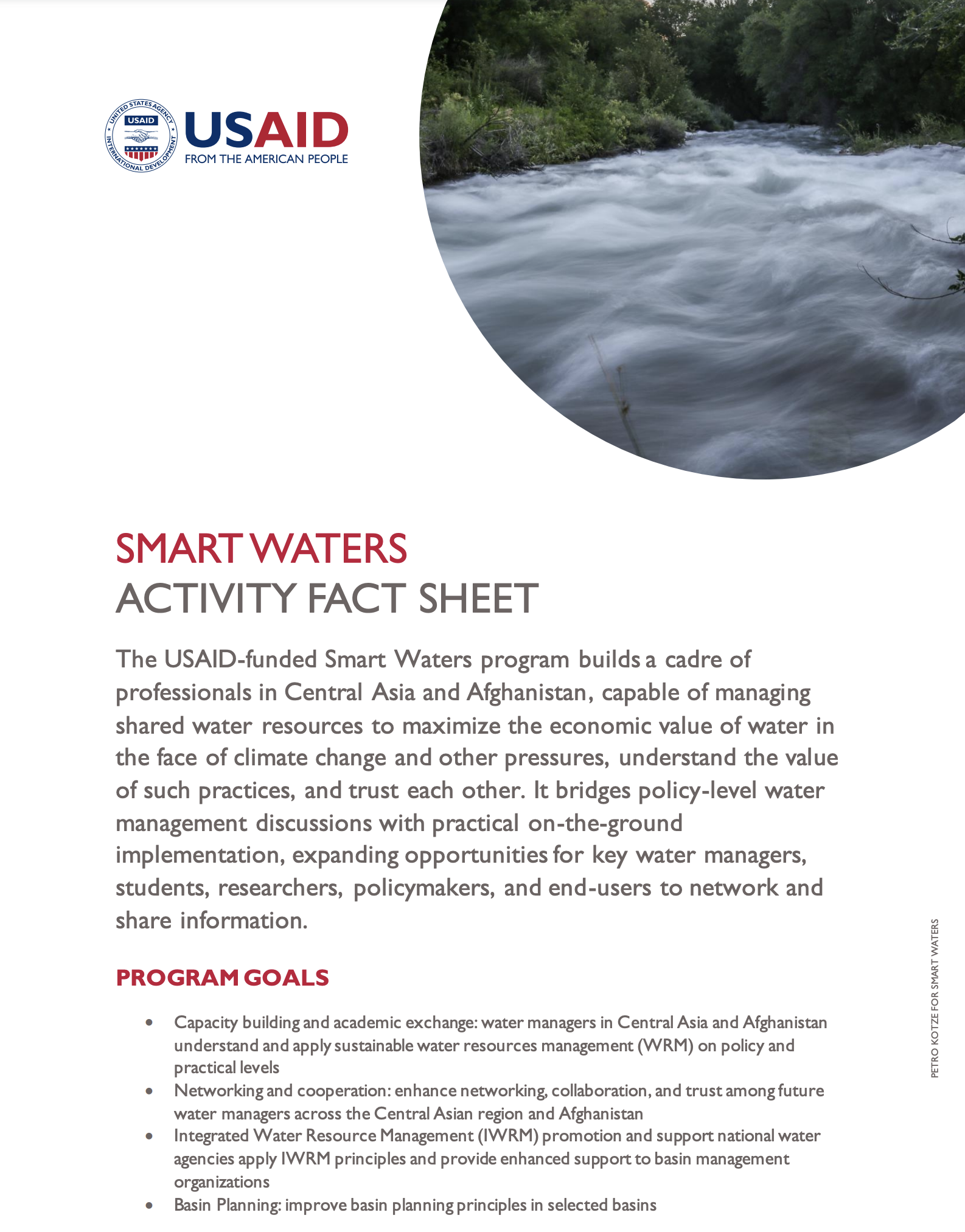Speeches Shim
Smart Waters ![]() (pdf - 371k)
(pdf - 371k)
The USAID-funded Smart Waters program builds a cadre of professionals in Central Asia and Afghanistan, capable of managing shared water resources to maximize the economic value of water in the face of climate change and other pressures, understand the value of such practices, and trust each other. It bridges policy-level water management discussions with practical on-the-ground implementation, expanding opportunities for key water managers, students, researchers, policymakers, and end-users to network and share information.
Program goals
- Capacity building and academic exchange: water managers in Central Asia and Afghanistan understand and apply sustainable water resources management (WRM) on policy and practical levels
- Networking and cooperation: enhance networking, collaboration, and trust among future water managers across the Central Asian region and Afghanistan
- Integrated Water Resource Management (IWRM) promotion and support national water agencies apply IWRM principles and provide enhanced support to basin management organizations
- Basin Planning: improve basin planning principles in selected basins
Program accomplishments
- 36 students are set to graduate with full ride scholarships from the Kazakh-German University (DKU) with a two-year master’s degree in Integrated Water Resources Management
- 50 master’s students from Tashkent Institute of Irrigation and Agricultural Mechanization Engineers (TIIAME) and DKU participated in three summer schools organized by Smart Waters in Tashkent, gaining practical knowledge on water resources engineering
- Smart Waters established 13 Small Basin Councils at 8 small transboundary watersheds in 5 Central Asian countries and Afghanistan and hosted 17 joint meetings to seek solutions on common water management issues
- Smart Waters trained over 2800 participants in water resources management, water diplomacy, water saving technologies, and international water law through 100 capacity building events
- 39 young researchers received grants to support their field studies on water resources management and climate change issues
- 30 representatives from Afghanistan’s governmental and non-governmental sectors participated in Smart Water’s five annual Central Asian Leadership Programs, strengthening connections and building trust among future leaders in Afghanistan and Central Asia
- Smart Waters supported national water sector reforms across Central Asia and Afghanistan:
- In Afghanistan, a model has been established for information exchange and data collection among the national entities engaged in water resource management
- In Kazakhstan, two national professional qualification standards have been updated for use by universities and water sector employers
- In the Kyrgyz Republic, the government has ratified the addendum to the Law on Water and the Water Code aimed at creating economic incentives of water use; and a unified hydrological glossary has been developed for all those involved in water sector, including academia and ministries
- In Tajikistan, the Law on Irrigation and Reclamation was drafted; the procedure for approving and permitting special water use and the procedure for rationing pollutant discharge into water bodies was developed
- In Turkmenistan, a Water Balance Calculation Manual, Operational Provisions for Irrigation and Drainage Systems and regulation on water requirements for major agricultural crops have been developed
- In Uzbekistan, the procedures for accounting, reporting, and monitoring of water resources use and the arrangements for preparing safety declarations for hydraulic structures have been developed.


Comment
Make a general inquiry or suggest an improvement.